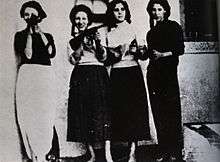Djamila Bouhired
| Djamila Bouhired | |
|---|---|
| Born |
c. 1935 French Algeria (now Algeria) |
| Nationality | Algerian |
| Organization | Armée de Libération Nationale (ALN) |
| Movement | Front de Libération Nationale (FLN) |
| Religion | Sunni Islam |
| Spouse(s) | Jacques Vergès (1963[1]–2013) |
| Relatives |
|
Djamila Bouhired (Arabic: جميلة بوحيرد, born c. 1935[2]) is an Algerian militant.
Bouhired is a nationalist[2] who opposed the French colonial rule of Algeria. She was raised in a middle-class family, having attended a French school. She would go on in her youth to join the Algerian National Liberation Front (FLN) while a student activist. There she worked as a liaison officer and personal assistant of FLN commander Yacef Saadi in Algiers. Despite her fame and being widely considered as one the faces of the Algerian Revolution, very little is known about her life.[3]
Algerian independence movement

Djamila Bouherid was born to a middle-class family in colonial Algeria. When she was still a student in a French school, she discovered her revolutionary spirit. When all the Algerian students repeated every morning "France is our mother", Bouhired would stand up and scream "Algeria is our mother!" Of course, she was punished for this by the principal. From this time, Bouhired was drawn to the revolutionary cause. Her brothers having already been involved with the underground nationalist struggle, Bouhired was quick to join and her profile would quickly rise in stature. During the revolution she worked as a liaison agent for the commander Saadi Yacef.
In June 1957, before a large planned demonstration, she was captured by the French and, she claims, tortured for information about that demonstration. She did not divulge any information under torture and reportedly repeated "Algeria is our mother" while being tortured (the information is based on her own account and cannot be independently verified).
In July 1957 she was tried for allegedly bombing a cafe, which killed 11 civilians inside. At the time a French lawyer named Jacques Vergès, sympathetic to the cause of the Algerian nationalists, heard of her case and decided to represent her. In what would be a historic trial, Vergès accused the government of themselves having committed the acts charged in his defense, waging a public relations campaign on her behalf. Despite his efforts, she was convicted and sentenced to death by the guillotine.
Partly due to his strategy, the French government found itself under overwhelming pressure from the world's public opinion, and the execution was postponed indefinitely, with Bouhired imprisoned in France. As the end of the war drew near, she was released along with many other Algerian prisoners. Vergès claimed to have become a target of the French colonial government, which allegedly launched several failed assassination attempts against him, including a bomb placed in his apartment and another in his car. Bouhired and Vergès would be married a year after Algeria's independence, with his having converted to Islam by this time, taking the first name Mansoor. The couple would have two children, Meriem and Liess Vergès. Bouhired became chairwoman of the Algerian Women Association in independent Algeria, and was constantly at odds with then-Algerian President Ahmed Ben Bella. Later she and her husband moved to Paris.
Period of imprisonment
Very few details about what transpired during her imprisonment can be independently confirmed. The only information available is what Bouhired and sources related to her have claimed afterwards. What she stated is that she was subjected to torture during her imprisonment and that the torture was not limited to her, that her brothers were also subject to torture, one of them having been tortured in front of their mother.
Present day
Djamila Bouhired resides in the capital of Algeria, Algiers, and continues to be a militant for several causes of which she participates in protest and marches.
In popular culture
She was one of the trio of FLN female bombers depicted in the 1966 film The Battle of Algiers. She was also depicted in the film Jamila, the Algerian (1958) by Egyptian director Youssef Chahine and in Terror's Advocate, a documentary film about Jacques Vergès.
References
- ↑ Mother Jones Magazine. Books.google.co.uk. Retrieved 2016-06-02.
- 1 2 Kuhlman, Erika A. (2002). A to Z of women in world history. Infobase Publishing. p. 176. ISBN 978-0-8160-4334-7. Retrieved 6 November 2010.
- ↑ "A Savage Peace: Algeria 1954-1962, by Alistair Horne, copyright 1977, 1987, 1996 and 2006 by Alistair Horne